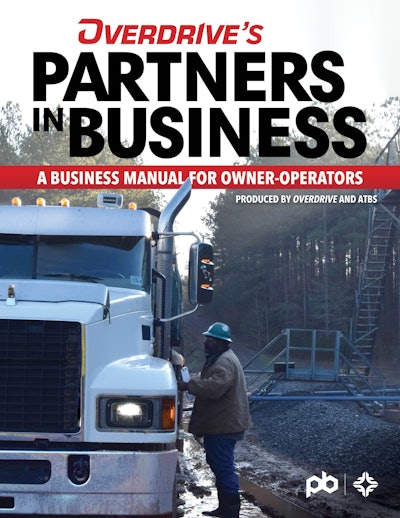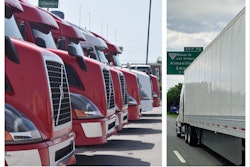For an owner-operator, necessary tax payments associated with truck ownership and operation start with required truck registration.
Independents are responsible for their own registrations. Leased owner-operators have the option of doing it themselves or letting the company they are leased to handle it. Generally, the company deducts the cost from the driver’s settlements. That might be easier, but if you get your plate through the carrier, you must leave it behind if you sever ties.
The cost of registering a truck varies from state to state, but you aren’t allowed to shop for the cheapest base state. To base-plate in a state, you must:
- Have an established place of business in that state, with a street address, a listed telephone number and at least one person conducting business at that location. A post office box is not sufficient.
- Maintain records in that location.
- Accrue miles in that state.
Before you can register, your base state will require you to pay the federal heavy-vehicle use tax. Also, if you don’t register your truck within 60 days of purchase, your base state will require proof of payment, usually a copy of Internal Revenue Service Form 2290 (heavy vehicle use tax return) and a canceled check.
Your truck must be registered in every state through which you travel. Years ago, you had to register separately in each state, but in 1991 Congress created the International Registration Plan, a streamlined nationwide system for truck registration.

Under IRP, you fill out a form and pay your base state for your registration. Similar to the way the International Fuel Tax Agreement apportions fuel taxes, a percentage of your fee goes to each state you travel through based on the number of miles you run in that state. When you register, you need to estimate how many miles you will travel in the coming year, state by state. Fees vary by each state. Find more about your state via its department of motor vehicles website -- find resource sites for all 50 U.S. states below.
[Related: Fuel taxes: Finding the cheapest fuel about more than the pump price]
Filing Form 2290 for Heavy Highway Vehicle Use Tax
The summer of 2020 was remarkable in many ways, as the COVID-19 pandemic scrambled supply chains, the virus itself spread all around the nation, and nearly every in-person trucking event to speak of was canceled. Plenty tax deadlines were extended, furthermore, from the spring in order to give U.S. citizens and businesses relief in an increasingly topsy-turvy time.
One tax deadline, however, would stand firm -- the Aug. 31 date on which most owner-operators and fleets of all sizes must file Form 2290 with the Internal Revenue Service to pay the annual Heavy Highway Vehicle Use Tax (HHVUT). Filing season for the 2290 tax opens typically on July 1 of each year, and for one-truck owner-operators running continuously throughout the year, the HHVUT isn't a heavy lift at a maximum of $550 per truck.
As such, it's a tax that can be easy to overlook, with penalties for late payment or nonpayment, as with other filings.
As with registrations/plates, though, there are exceptions for leased owners -- particularly operators in lease-purchase arrangements with carriers and/or third-party leasing companies. The owner of the truck is required to pay the tax. Thus, if you're leasing the truck, the title remains with the carrier or leasing company until your purchase at the end of the term. One frequently asked question:
Does the carrier or leasing company file the 2290 or does the owner-operator file it?
 This feature is part of Overdrive's coproduction with business services firm ATBS of the Partners in Business manual, a comprehensive playbook for owner-operator careers. Browse the 2025 edition in its new dynamic online library format in eight sections via this link.
This feature is part of Overdrive's coproduction with business services firm ATBS of the Partners in Business manual, a comprehensive playbook for owner-operator careers. Browse the 2025 edition in its new dynamic online library format in eight sections via this link.
In any case, one important item that new 2290 filers will need is an employer identification number (EIN). That includes both owner-operators whose businesses are sole proprietorships and who file taxes routinely with their Social Security numbers for identification. Owners can obtain the EIN directly with the IRS. Follow this link for the online IRS tool that walks business owners through the process.
[Related: 2290 tax filing season: Here's how to get ahead of the deadline]
Filing the 2290 form and paying the tax itself is generally a simple process itself, particularly for online e-filing -- a requirement for fleets with 25 trucks or more. Smaller fleets and individual owner-operators still have the option of paper filing, though the convenience of online systems have attracted many to e-file service providers, even including fees for use of those services ranging from as low as $10 to more than $40 for a single power unit.
There are many options for e-filing. The IRS maintains a list of approved "modernized e-file" services for 2290 filing -- the most recent tax year's listed providers are here.
State-by-state registration resources
Alabama, revenue.alabama.gov, (334) 242-9000
Alaska, doa.alaska.gov, (855) 269-5551
Arizona, azdot.gov, (602) 255-0072
Arkansas, dfa.arkansas.gov, (501) 682-4692
California, dmv.ca.gov, (800) 777-0133
Colorado, mydmv.colorado.gov, (303) 205-5600
Connecticut, portal.ct.gov/DMV, (860) 263-5700
Delaware, dmv.de.gov, (302) 326-5000
Florida, flhsmv.gov, (850) 617-2000
Georgia, dor.georgia.gov, (855) 406-5221
Hawaii, mvr.ehawaii.gov, (808) 532-7700
Idaho, itd.idaho.gov/dmv, (208) 334-8611
Illinois, ilsos.gov, (800) 252-8980
Indiana, in.gov/bmv, (888) 692-6841
Iowa, iowadot.gov/mvd, (515) 237-3305
Kansas, ksrevenue.org, (785) 296-3621
Kentucky, drive.ky.gov, (502) 564-1257
Louisiana, dps.expresslane.org, (225) 925-6146
Maine, maine.gov/sos/bmv, (207) 624-9000
Maryland, mva.maryland.gov, (410) 768-7000
Massachusetts, mass.gov, (857) 368-8000
Michigan, michigan.gov/sos, (888) 767-6424
Minnesota, dps.mn.gov, (651) 297-2126
Mississippi, dor.ms.gov, (601) 923-7100
Missouri, dor.mo.gov, (573) 526-3669
Montana, mvdmt.gov, (406) 444-3933
Nebraska, dmv.ne.gov, (402) 471-4435
Nevada, dmv.nv.gov, (775) 684-4786
New Hampshire, dmv.nh.gov, (603) 227-4000
New Jersey, nj.gov/mvc, (609) 292-6500
New Mexico, mvd.newmexico.gov, (888) 683-4636
New York, dmv.ny.gov, (518) 486-9786
North Carolina, ncdot.gov/dmv, (919) 715-7000
North Dakota, dot.nd.gov, (701) 328-2500
Ohio, bmv.ohio.gov, (844) 644-6268
Oklahoma, ok.gov/tax, (405) 521-3160
Oregon, oregon.gov/odot/dmv, (503) 378-6699
Pennsylvania, dmv.pa.gov, (800) 932-4600
Rhode Island, dmv.ri.gov, (401) 462-4368
South Carolina, scdmvonline.com, (803) 896-5000
South Dakota, dor.sd.gov, (605) 773-3541
Tennessee, tn.gov, (888) 826-3151
Texas, txdmv.gov, (888) 368-4689
Utah, dmv.utah.gov, (801) 297-6800
Vermont, dmv.vermont.gov, (802) 828-2000
Virginia, dmv.virginia.gov, (804) 497-7100
Washington, dol.wa.gov, (360) 664-1222
West Virginia, transportation.wv.gov/dmv, (304) 558-3900
Wisconsin, wisconsindot.gov, (608) 266-9900
Wyoming, dot.state.wy.us, (307) 777-4375
Read next: Income tax and other taxes: Understanding the importance of recordkeeping for deductions









